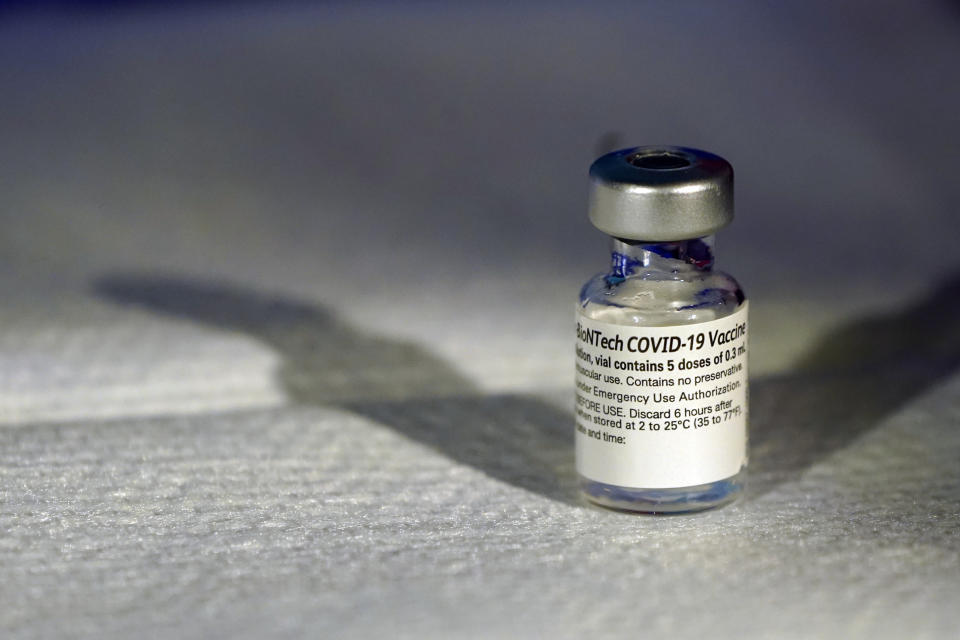As US rushes to give shots, Tennessee builds vaccine reserve
NASHVILLE, Tenn. (AP) — As states rush to inoculate health care workers on the front lines of the coronavirus pandemic, only Tennessee has prioritized building its own emergency reserve of the coveted vaccine.
An Associated Press review of each state’s COVID-19 vaccine distribution plans shows that Tennessee alone has specified it will hold back a small portion in “case of spoilage of vaccine shipped to facilities.” The state’s initial shipment of the Pfizer-BioNTech vaccine that arrived Monday was not distributed for inoculation, so health care workers had to wait until the second shipment arrived days later.
The move has baffled health care leaders, who say medical workers should take priority, especially as the state hits record case numbers.
“Given the extremely high case counts right now, our frontline health care workers are at higher risk than ever, I would personally advocate for those doses being used rather than stockpiled,” said Dr. Isaac Thomsen, who leads the Vanderbilt Vaccine Research Program Laboratory.
Despite a federal stockpile created so states can use all of their supplies, Tennessee officials maintain that the reserve is necessary because of the risk of damaging the vaccine, which requires ultracold storage.
“If a hospital receives a case of the vaccine and it’s spoiled or broken, we can immediately deploy that (emergency reserve) to them,” state Health Commissioner Lisa Piercey said.
In contrast, the AP review of vaccine distribution plans across the country shows that other states are stressing the need to quickly distribute every vaccine to those with the highest risk of exposure.
Wisconsin has no mention of an emergency reserve in its distribution plan, and when asked by AP this week, the state health agency responded that it was “not holding any vaccine back.” In Ohio, Republican Gov. Mike DeWine not only touted the arrival of the state's first vaccines but also praised the rapid administration of the shots to front-line medical workers.
Idaho health experts have allotted some flexibility in their effort to move doses around quickly to ensure they do not end up sitting on shelves.
“What we do not want is any wasted vaccine,” Sarah Leeds, program manager for the Idaho Immunization Program, said earlier this month during the state’s COVID-19 Vaccine Advisory Committee.
In North Carolina, state officials stated in their distribution plan that “no doses will be held back at the jurisdiction or provider level. The federal government will hold back product initially to ensure second doses are available.”
Other states committing to use every dose because the federal government has its own backup supply include Illinois, Iowa, New Mexico, Virginia and Washington.
Yet in Tennessee, the first shipment of 975 Pfizer-BioNTech vaccine doses went into the reserve. The second shipment of 56,500 shots that came in Wednesday was being distributed to more than 70 hospitals across the state.
The 975 doses is a fraction of what the state will eventually dispense to the public, but according to Tennessee’s vaccine plan, it will store away an additional 5,000 doses of the Moderna vaccine, or about 5% of the state’s first shipment from the company, which is expected to arrive next week.
When asked about the growing reserve, Piercey on Thursday told reporters that those 5,000 Moderna doses in reserve will be used in areas with vulnerable populations.
However, that strays from the state plan, which clearly states that the 5,000 Moderna doses will be “reserved by the State in case of spoilage.” The state plan says only 5% of the allocation from “all other vaccine manufactures” should be used for the vulnerable areas.
Piercey demurred when asked why the emergency reserve was necessary when the federal government was also building up its backup supply. Instead, she pointed to the delicateness of the vaccine and the high risk of it being damaged if not handled properly.
The Pfizer-BioNTech vaccine requires ultracold temperatures of about minus 70 degrees Celsius (minus 94 F). The Moderna vaccine uses the same technology as Pfizer-BioNTech’s but does not require the same deepfreeze temperatures.
Tennessee health officials also argue that waiting until the state had a larger quantity of the vaccine was more equitable rather than appearing to favor one location over another when deciding where the initial 975 doses should go.
However, critics counter that the state's record case numbers, climbing death rates and overwhelmed hospitals should outweigh any concerns of favoritism or priority to build up a reserve.
Notably, Tennessee ranks second in the country for new cases per capita with roughly 1,369 confirmed cases per 100,000 people, according to the count kept by Johns Hopkins University. At the same time, Gov. Bill Lee, a Republican, has refused to implement a statewide mask mandate and has chosen to stress the importance of personal responsibility to curb the spread of the virus.
Doctors are now pleading with state leaders to take action as they witness hospitals and other health providers experience increased staffing challenges because of workers contracting the disease.
“Please allow those 975 vaccines in your office in your Twitter photo op to be for front line workers,” wrote Dr. James Parnell, president of the Tennessee chapter of the American Academy of Emergency Medicine, on social media.
“Even a single dose is more effective than a dose in a box,” Parnell added.
___
Follow AP coverage of the virus outbreak at https://apnews.com/VirusOutbreak and https://apnews.com/UnderstandingtheOutbreak.
___
Associated Press writers Andrew Welsh-Huggins in Columbus, Ohio; Scott Bauer in Madison, Wisconsin; Rebecca Boone in Boise, Idaho contributed to this report.



